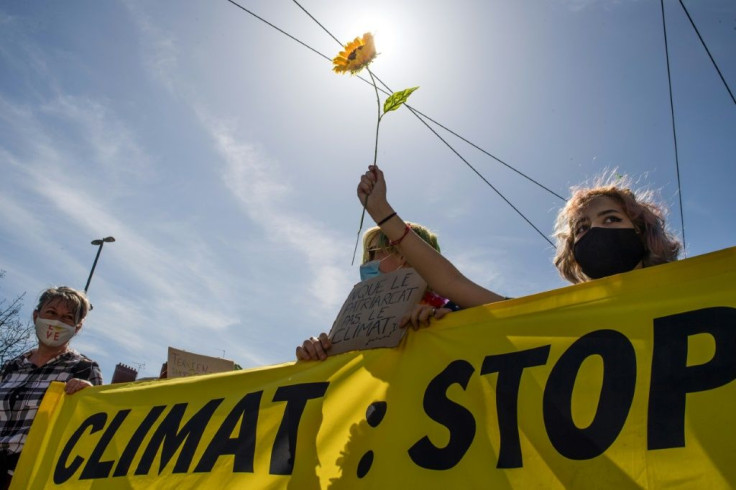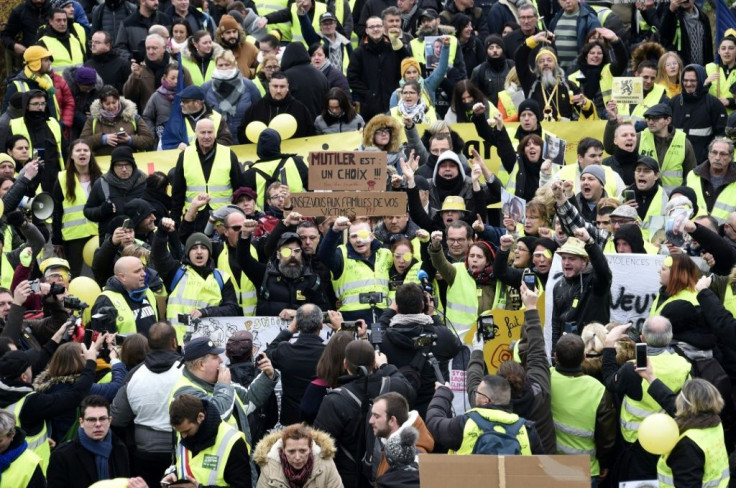French Parliament To Vote New Climate Law Criticised By Green Groups
The French parliament is set to vote through a new climate change law on Tuesday intended by President Emmanuel Macron to reinforce his green credentials one year ahead of national elections.
The draft legislation is almost certain to be approved in a first reading by the lower house of parliament, where Macron has a working majority, but it has been heavily criticised by environmental groups.
Campaigners see it as too timid given the pace of climate change globally and accuse the French leader of half-hearted commitment to a cause he has admitted to embracing belatedly.

France's environment minister, Barbara Pompili, has defended the text, saying it "will affect the daily life of all of our citizens" and is "one of the biggest laws of the (president's) term".
Measures include bans on domestic flights under two and half hours that can be done by train, restrictions on renting badly insulated properties, or the creation of a new "ecocide" crime to punish polluters.
The overall aim is to put in place measures that will enable France to meet its target of reducing its greenhouse gas emissions by 40 percent compared with 1990 levels by a deadline of 2030.

Lobby groups such as Greenpeace have called it a "lost opportunity of Macron's term", while even the president's own environmental advisory council said it would "have a potentially limited impact".
It is also less ambitious than new targets for 55 percent cuts agreed at the EU level and falls short of a German plan which was rejected last week by the country's constitutional court as "insufficient".
Climate change and protection of the environment are likely to be bigger themes in next year's presidential election than the last one in 2017, which Macron won while barely campaigning on the issue.

The main Green party in France made major gains in cities such as Strasbourg, Bordeaux and Lyon in local elections last year, mirroring a Europe-wide trend in favour of environmental groups.
In Germany, the Green party has overtaken Chancellor Angela Merkel's conservatives in recent polls.

The climate law has also been a test of what Macron billed as a more inclusive form of government that has seen members of the public invited to help draft the legislation.
After anti-government riots by so-called "yellow vest" protesters in 2018, he pledged to change his leadership style which was seen by critics as too centralised and removed from the wider public.
A hundred and fifty people were chosen at random to form a "Citizen's Convention on Climate" which was tasked with recommending measures that would enable the country to meet its emissions targets.
But after seeing the legislation submitted to parliament, many members felt let down and accused Macron of reneging on a commitment to adopt their ideas.
Cyril Dion, a leading figure from the convention, attended a protest rally calling for bolder action in March and said the law "absolutely does not enable France to meet its objectives."
The government counters that is trying to find a balance between reducing emissions while protecting workers and industry at a time when the economy has been battered by the Covid-19 pandemic.
"With the law, we are walking a fine line, making big changes while keeping it economically and socially acceptable," Pompili told the Financial Times last week.
Macron was stung by the "yellow vest" protests which were initially sparked by environmental policies such as raising taxes on diesel as well as old, polluting cars.
His predecessor Francois Hollande was forced into a U-turn by truck drivers, known as the "red hats", who protested against his efforts to impose an environmental tax on heavy-goods vehicles.
Even if passed by the lower house and the Senate, the new law will almost certainly need to be updated in order for France to keep up with evolving European Union targets for emissions reductions.
The European Parliament and EU member states agreed a target in late April of cuts of at least 55 percent by 2030 from 1990 levels -- compared to the 40 percent target set in the French law.
© Copyright AFP 2024. All rights reserved.





















